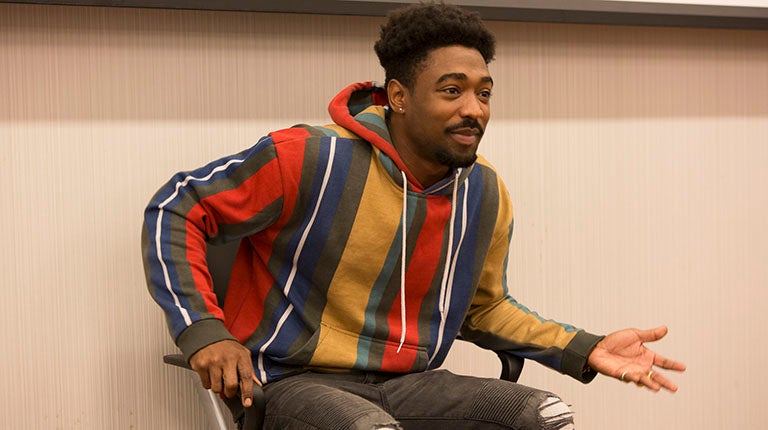Poet Delivers Inspiring Performance for Anthropology Class

Kondwani Fidel, a poet and writer from Baltimore, gave a spoken-word performance and answered questions from Prof. Sylvia Önder’s Anthropology and Youth Culture class at the Healey Family Student Center last week. (Photo: Sasha Patkin/CANDLS)
November 21, 2016 — Baltimore-based writer and poet Kondwani Fidel visited campus earlier this week for a spoken word poetry performance and conversation with students.
Kondwani Fidel (born Kondwani Fidel Russell) was invited to speak by Professor Sylvia Önder’s Anthropology and Youth Culture course, which examines the ways in which youth influence cultural movements and vice versa. Excerpts from Russell’s 2017 book Raw Wounds feature prominently in Önder’s lessons, and videos of his poetry have been assigned to students throughout the semester. Önder was glad to bring him to campus, with the help of faculty funding from the Center for Social Justice.
“I have been trying to get my students to consider how anthropology is written by living people whose identities shape their research and writing,” Önder said. “I want them to think of an author as more than just a name to be properly cited.”
Önder’s students enjoyed getting to know a poet they had studied.
“It’s not often that I get to meet the people that I’m reading about in class,” Jerome Smalls (B’19) said. “Kondwani was every bit as real and authentic as his words I read before meeting him.”
Russell has starred in several moving performances about life in his native Baltimore that have gone viral on social media in recent years. An impromptu performance he gave for a class while substitute teaching has reached nearly 3 million views on Facebook, and his August 2017 essay “How a young boy has been decaying in Baltimore since age 10: A Death Note” has received recent critical attention. He’s now pursuing his MFA from the University of Baltimore.
In Raw Wounds, his first published book, the 24-year-old Russell “uses youth-friendly language to explore the dynamics of social oppression and social justice.”
At his appearance in the Healey Family Student Center last week, Russell candidly discussed his own background, including the ways he’s been able to express past traumas in poetic language.
“He did not hold back any emotions or try to sugarcoat the issues he faced,” Trevor O’Connor (C’20) said. “Being able to listen to an artist perform his art — and discuss his life in an unfiltered and vulnerable way — spoke not only to his creativity and artistry, but also of the work that needs to be done to fight for racial, economic, and social justice.”
Önder hopes that Russell’s appearance will help students better understand issues of racial justice and systemic oppression, as well as the role youth activism can play in cultural change.
“I think it’s easy to compare your struggle to those of others and think that yours isn’t important enough or tough enough to be worthy of sharing,” Nicole Rose (C’18) said. “Even though our experiences and struggles may be different, sharing them reminds us that we are not alone.”
- Tagged
- Anthropology
- CSJ
- Events